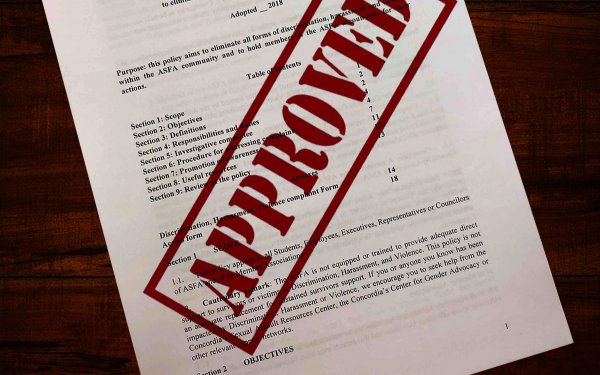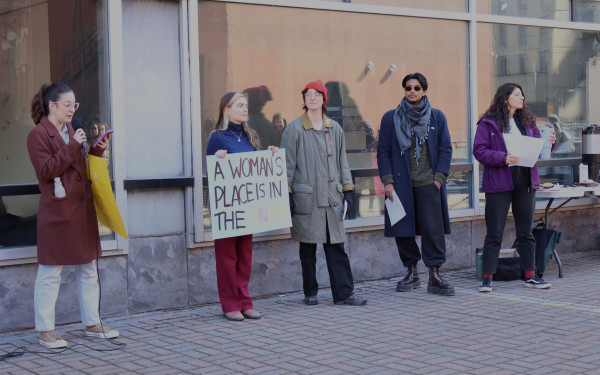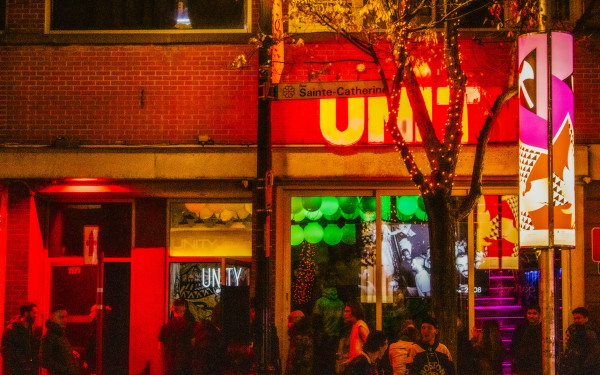Body Dump
Fecal Matter and The Dehumanization Of The Syrian Struggle
Earlier this week, I had to endure one of the most traumatic and triggering experiences of my life at the hands of a local art collective called Fecal Matter.
My struggles as a Syrian refugee woman were disrespected, dismissed, silenced, and mocked by members Steven Bhaskaran, Hannah Dalton, Mikaelle Huard-Berro, and Benaiah Dyett Mcdonald and their following.
This all started a few weeks ago, towards the end of October. I had attended an event organized by the group with my partner and our friends. I enjoyed myself that night, despite the fact that their scene and events are very obviously white-washed. I had first met the group when my partner modeled for a LaSalle college fashion show that three of the members (Dalton, Huard-Berro and Bhaskaran, all graduates of LaSalle) were a part of. While the event in October itself was fine, what I found out later about it tainted the memory, hard. As it turns out, the group had used the disturbing viral image of the dead Syrian refugee child Aylan Kurdi to promote their event on its Facebook page and then later removed it due to complaints.
I was disgusted. I am a Syrian refugee. The majority of my family members are Syrian refugees, or they are still stuck in Syria having to endure constant airstrikes, shelling and more of the unthinkable at the hands of the brutal regime. I have seen somebody I know and love dead on the news in a pile of bloody bodies with regime soldiers, their murderers, proudly standing beside them. Over the past four and a half years, I have developed major depressive disorder, an anxiety disorder and PTSD. Every day, I am terrified of which one of my family members will be murdered next – I am waiting for that next phone call. Even my family and I are not safe here, in Canada – currently, we’re going through an emotionally draining, potentially life threatening immigration case. Our status in Canada is unstable, we only have Syrian passports and we are all wanted by the regime. Losing this case means our deportation, followed possibly by death or, even worse, torture and rape in the regime’s notoriously vicious prisons. So, needless to say, I felt like my struggle and the struggle of my people being co-opted for “art” by this group, was less than respectful.
I kept thinking that because this group had become so popular in the fashion and party scene in Montreal, I could not do anything about it. I wrote a status, confided in my closest friends and tried to forget it—but I couldn’t. A few days after, Hannah Dalton messaged my partner about an event they had coming up soon. My partner rejected their invite and told them they cannot support them because of what they did. They also sent her screenshots of my status explaining why using Syrian pain for your own advantage is so harmful. In response, Dalton attempted to justify the group’s actions by calling my struggle and trauma an “opinion” that is “stereotypical,” and they were just trying to make “political and social commentary,” and fight for “social justice and human rights”. Apparently, fighting for social justice means triggering and speaking over those who are actually suffering from the issues being commented on. They described what they do as “purely artistic” and that it is “something that forces people to think critically.”
At this point, I was furious and horrified. They have no idea what it is like to actually live through this struggle – to them, my reality is a means to an artistic end, used to be “edgy” or “push boundaries.” This sick arts culture that revolves around shock factor, around controversy, and using the plight of marginalized peoples for a certain aesthetic, is so incredibly inhumane that it hurt me to the point of triggering my traumas. Although there is nothing wrong with their intentions to push boundaries, the fact that Syrian refugees mean so little to this group that they can just use photos of a dead child’s body for their own advantages, is disturbing. And to then speak over and dismiss a Syrian refugee who was triggered and very rightfully upset, is just unbelievable. My pain is not for anyone’s art but my own.
Not once in this response did they apologize for what they had done. They did not care about what their post would do to me and other Syrians – to them, it was just another gory photo to incite interest in their group. Aylan Kurdi was not a murdered child to them, he was not one of the hundreds of thousands of Syrian children whose lives were ripped from them so violently, and he wasn’t the person washed up onto a shore that I constantly fear my own young cousins could become. That same day, I found the group’s Instagram page and saw that they had posted a different gory image of a brown child, a baby in diapers, dead on a shore with the horribly insensitive caption “photoshoot overseas.” This is the only picture they posted that I have a screenshot of and the censored image is posted below.
That day I posted several statuses about this matter, including one that summarized what happened. I urged people to boycott them and to share my status. I shared screenshots of my status onto the page for their most recent event, URL vs IRL. It was immediately deleted and I was blocked from the page. Posts started emerging on the page, making fun of me and how they deleted my posts. At this point, I was getting tons of messages, comments, shares, and solidarity from my friends and people of color (POC) communities online. They all began posting on the page, calling the group out and standing up for me – the group and their following were continuing to argue, dismissing my trauma and their silencing of me. As this progressed, I was still being mocked and made fun of. They even began using what they had done as a promotion strategy; Steven Bhaskaran was proudly stating that Fecal Matter “doesn’t apologize for being so disrespectful, immoral, selfish, destructive, harmful, and evil”.
A friend of mine got me in touch with the POC manager of the bar, Felix, where URL vs. IRL was meant to be held at. I messaged her, explaining the entire situation and providing screenshots of everything. She messaged back expressing empathy, understanding, and support. She also told me she would be speaking to the group.
Coincidentally, very soon after appeared a desperate, insincere, and very suspiciously worded attempt at an apology to me on the event page. I posted a response calling them out on what was a clearly insincere, ignorant, and entitled ‘apology’. They seemed to care only about not receiving any repercussions. Their only comment back to me on my post was that the bar had nothing to do with what happened, a very obvious attempt to convince the bar this would not affect its reputation. The apology itself seemed rehearsed, as if they had been told exactly what to say in order to get me to shut up. I did not believe any of it.
Posts on the page mocking me continued, with the group doing nothing to stop them. One attendee of the event called me things like “butthurt” and a “pussy,” while defending what the group did under the guise of it being “art”. The same person asked me outright, “Are you butthurt because your people are dying?” Someone posted a meme of Michael Jackson eating popcorn, as if my pain and trauma was some sort of a show everyone could sit and enjoy. A couple of people began saying they “can’t believe we missed all the action” and that the group should “stick by the use of horror for events”. One of them also referred to what was happening as the “internet show” and mentioned that people had been texting them all day telling them that they were “missing out.”
These same two people were also making posts mocking other former genocides and offering gory pictures to use for events. My struggle had become a spectacle, something to stare and poke fun at. The group did nothing more than vaguely mention they did not support what was happening. Funnily enough, they did not seem inclined to delete any of this mockery of me or try and ban the members doing it – unlike what they did to me and unlike what they did to my friends when they began calling them out.
Upset and hurt, I messaged the bar manager again informing them of what was happening on the page and telling them that my friends in the POC community, and especially in the Queer POC community, would not support the bar if this was allowed to continue. She responded back saying the event would be cancelled, a resident DJ would play at the bar instead, and the proceeds for that night would be donated to a charity for Syrian refugees.
Of course, I was very glad to see the event cancelled, and at least Syrian refugees would end up benefitting from this whole situation. However, this was not the end of the matter for me. I was still very triggered; I had just endured having my entire life struggle laughed at in an intensely public, horrifying way.
What kept me going is that I was getting so many messages of support from so many people. From my friends, to complete strangers in online POC communities, to friends and acquaintances of the group, to people who had worked with them (DJs, models and event promoters).
So many people were messaging me thanking me for standing up to the group, commending me for having the bravery and strength to go through this all, and letting me know that they would not be attending any of the group’s events. Although I am still reeling from what happened, although just thinking about it makes my body shake and my heart race. I feel like I have been invalidated, and had my struggles and identity rejected, as all the love and solidarity I have received has kept me from completely falling apart.
Clearly, this scene and this group are not safe for people of color. Everyone I know from the POC community here in Montreal does not feel safe because of what happened and because of these reasons, I can’t let this go. I was forced to be completely transparent and honest about my struggles to be listened to but instead of being met with the sympathy I know me and my people deserve, I was met with complete invalidation. No apology, excuse, or discussion can take that away. I know that I will be told what every marginalized person is told when we stand up to someone: that I am overreacting and need to calm down, that I am being rude, and should just get over it but to say that is also dismissive. My struggle is my own and only I get to decide how I react to it, and I am not backing down. I won’t ever stop fighting for my people’s right to live and to be heard, and I will not let anyone stand in my way.
I am a Syrian refugee woman. My anger and struggles will always be valid, always be important, and I will not let anybody take that away from me.





